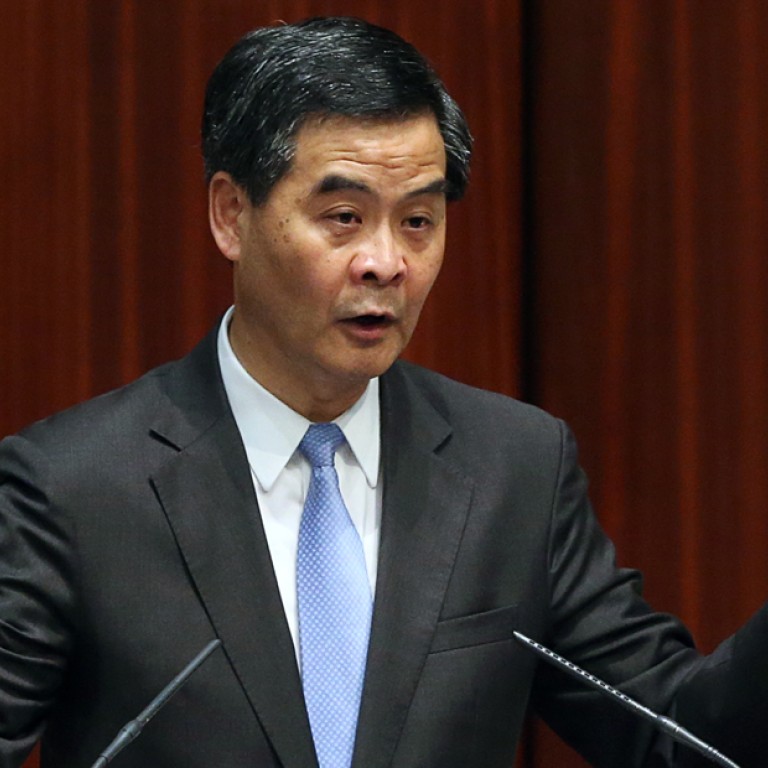
Few pan-democrats appointed as policy advisers in Hong Kong
Chief executive has mainly rewarded his backers in appointing policy advisers, survey shows
Chief Executive Leung Chun-ying has failed to fulfil his post-election pledge to unite both sides of the political spectrum in governing together, according to research by the .

More than 100 political figures and professionals who supported him during his campaign for the city's top job last year have been rewarded with such positions, compared with 68 who backed his key rival, former chief secretary Henry Tang Ying-yen.
The move was largely seen as a bid to remedy the pro-Beijing camp's post-election split between supporters of Leung and Tang, but Tang's backers enjoy more status at home in terms of business achievement and more clout than Leung's supporters, analysts say.
Among the administration's favourite picks in the 157 rounds of appointments are the key players in Leung's election office.
Apart from gaining a seat on the Executive Council, Fanny Law Fan Chiu-fun, for example, went from being Leung's campaign manager to being on both the Honours Committee and the Non-official Justices of the Peace Selection Committee. The two panels wield more power than most other statutory and advisory bodies because they can nominate awardees.
Another beneficiary of the Leung administration's largesse was Barry Cheung Chun-yuen, who was chairman of Leung's election office and dubbed his "top supporter". He gained the same three roles as Law, and also acted as vice-chairman of the Commission on Strategic Development and as a member of the Long-term Housing Strategy Steering Committee.
The government even extended his chairmanship of the Urban Renewal Authority beyond the normal six-year limit on the grounds that the authority required consistency.
However, Cheung lost all his public positions two months ago after his failed Hong Kong Mercantile Exchange was investigated amid allegations of forgery.
Leung's deputy election office chief, Laurence Ho Wing-him, sits on the Social Welfare Advisory Committee. His appointment was announced three months after Leung's accession.
New World Development executive director Leonie Ki Man-fung, another Leung electioneering deputy, became a councillor of the University of Hong Kong in November.
Leonard Cheng Kwok-hon, Leung's election adviser, is set to become Lingnan University president, and Herman Hu Shao-ming is council chairman of City University.
At the other end of the political spectrum, the pickings have been slimmer with pan-democrats given negligible power.
Most of the 15 appointees from outside the Beijing loyalist camp are long-serving lawmakers such as the Civic Party's Alan Leong Kah-kit and Democrats Albert Ho Chun-yan and Professor Law Chi-kwong.
But there are newer legislators, such as the city's first openly gay Legislative Council member, Raymond Chan Chi-chuen of People Power, who joined the advisory group on eliminating discrimination against sexual minorities. Pro-democracy legal scholar Eric Cheung Tat-ming retained his role on the Independent Police Complaints Council.
Tang's supporters, mostly well-known business leaders, also feature, although in smaller numbers. Among the newly-created, 23-strong Economic Development Commission are HSBC's Asia-Pacific chief executive Peter Wong Tung-shun, former Airport Authority head Dr Victor Fung Kwok-king, former MTR chief executive Chow Chung-kong, Trade Development Council chairman Jack So Chak-kwong, Ocean Park chief Allan Zeman, industrialists Stanley Lau Chin-ho and David Wong Yau-kar, and lawmaker Andrew Leung Kwan-yuen. All but Fung nominated Tang to run for election.
Political analyst Ivan Choy Chi-keung of Chinese University said Leung had brazenly shut pan-democrats out of decision-making.
"Even former chief executive Donald Tsang Yam-kuen attempted to appease pan-democrats at his term's beginning. It's obvious that Leung didn't even bother to do this."
Choy said Tsang had placed greater emphasis on business leaders - the source of Tang's support.
Civic Party lawmaker Claudia Mo Man-ching described Leung as "displaying favouritism, nepotism and cronyism" at the same time. "I'm especially worried about his appointment of people with connections to him into universities," said Mo, who teaches part-time at Chinese University.
The government says it always makes appointments based on talent.


